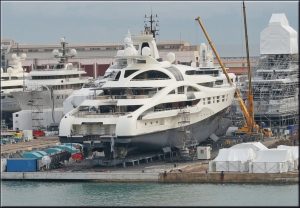94 Russian Domain: Economic Geography II – Oligarchs
What is an oligarchy? The philosopher Aristotle coined this term centuries ago, explaining that it meant rule by a few. Those few elite in the ruling class would be the oligarchs. Although this concept has been used to define different societies, in recent years it is directed mainly to Russia.
In Russia, the oligarchs often do not have a specific political position, but have such incredible wealth that their economic power brings outsized political influence as well. Or as Russian President Vladimir Putin has explained, “Oligarchs are those who use their proximity to the authorities to receive super profits.”1
It is curious that Russia should have these circumstances at present, when Russian history does not recall similar situations. During the tsarist period of Russia, indeed the tsars ruled with autocratic powers. Certainly there were other rich people, but their authority was dependent upon their respective tsar’s good favor and benevolence. Under Soviet communism, the expressed goal was a classless society. Instead, there was a vast lower-middle class, imbalanced by a few elite political figures. The political elite had comfortable lives with perks, such as better housing and access to restricted goods. However, even at the pinnacle, there was not fantastic wealth. Stalin was not a billionaire.
Upon the end of the Soviet Union, a great transformation of society began without a comprehensive plan. The pathway to political power shifted from the Communist Party to, well to something else. The political control of the economy faltered, as the transition to capitalism began. Under communism, the State owned all the significant means of production, except for personal property and small private plots of rural land. The State owned all the factories, all the resources, all the forests and fields, and just about everything. How to shift to capitalism with private ownership of property and resources?
A major and utilized approach argued that as the State had owned all the natural resources, inherently the people of Russia owned all the natural resources. As the State had owned all the factories, inherently the people of Russia owned all the factories. Therefore, the government issued vouchers, in a sense like shares of stock, to the citizens of Russia for ownership of various resources and factories. For many Russians, having lived all their lives under communism, these vouchers seemed alien and of uncertain value. For a savvy few, the vouchers were one means to wealth. Many Russians were delighted to be paid small sums for their vouchers, but the torrent of sales of vouchers to small numbers of speculators led to a short list of buyers owning huge quantities of vouchers. The individual vouchers were purchased for piddling sums, indeed below face value, whereas when totaled these shares accomplished control over massive fortunes of raw materials in particular. This was simply one of many means that a few people used to create incredible wealth in Russia, while the average lower-middle class person stayed lower-middle class or fell into poverty. These forms of wealth acquisition typically were opaque and corrupt.

These billionaires have a taste for ostentatious expression of their wealth. They build extravagant homes and show off luxurious toys. They buy sports teams. For instance, Mikhail Prokhorov owns the yacht Palladium (seen in the photo to the left), as the name reflected his wealth in minerals, in particular from the company Norilsk Nickel. Pictured here, the yacht is the world’s second largest, purchased for $400 million. From 2010 to 2019, he owned a controlling interest in the NBA team – the New Jersey Nets (in 2012 the team moved to New York City, becoming the Brooklyn Nets). Oligarch Roman Abramovich is the owner of the Chelsea Football club.
The oligarchs of Russia began their accumulation of wealth and power during the presidency of Boris Yeltsin in the 1990s, but continued through the two decades of rule by Vladimir Putin. Under Putin, it is clear that the continued wealth of the oligarchs is linked to Putin’s political patronage. A clear example is the case of Mikhail Khodorkovsky. Khodorkovsky became a billionaire, largely through ownership of the oil company Yukos. Overly emboldened by his wealth, he became an outspoken critic of Putin, so that in 2003 he was arrested for tax evasion. He was convicted and in 2005 was jailed, at first to a Soviet-style prison camp in the Chita region of Siberia. Putin pardoned him in 2013, upon his promise to stay out of politics.
Oligarch Boris Berezovsky also was a vocal critic of Putin. Berezovsky left Russia and was convicted in absentia of fraud and embezzlement. He never returned to Russia. After two cases of alleged and failed assassination attempts, Berezovsky was found dead at home in England in 2013, hanged under circumstances that a British inquest could neither verify as murder nor as suicide.
For a new list of Russian oligarchs, go to https://www.visualcapitalist.com/who-are-the-russian-oligarchs/ .
Putin now has been quoted as saying the oligarchs no longer exist in Russia, but this is silly. In 2018, the United States government released a list of Russian billionaires, labeling 96 of them as oligarchs. Putin himself clearly is a billionaire, though calculating his wealth is difficult.
The oligarchs of Russia are the consequence of a chaotic and runaway transition from communism to capitalism. It could be said that communist pioneer and the first leader of the Soviet Union, Vladimir Lenin is spinning in his grave, except that his preserved body literally still lies on display in the tomb in Red Square in Moscow.
Did You Know?
Check Your Understanding
Cited and additional bibliography:
1 Samuels, Joel. 2019. “What Is an Oligarch?” The Conversation. November 15, 2019. https://theconversation.com/what-is-an-oligarch-126244.
Guilford, Gwynn. 2018. “The Mystery of Russia’s Missing Wealth Shows How Putin Retains His Power.” Quartz. July 22, 2018. https://qz.com/1330955/russias-missing-wealth/.
Hoffman, David. 2011. The Oligarchs : Wealth and Power in the New Russia. New York, Ny: Publicaffairs.
mhobl. 2019. Russian Money. https://tinyurl.com/palladiumyacht. Attribution-NoDerivs 2.0 Generic (CC BY-ND 2.0).
Venditti, Bruno. 2022. “Who Are the Russian Oligarchs?” Visual Capitalist, 25 Mar. 2022, https://www.visualcapitalist.com/who-are-the-russian-oligarchs/.


